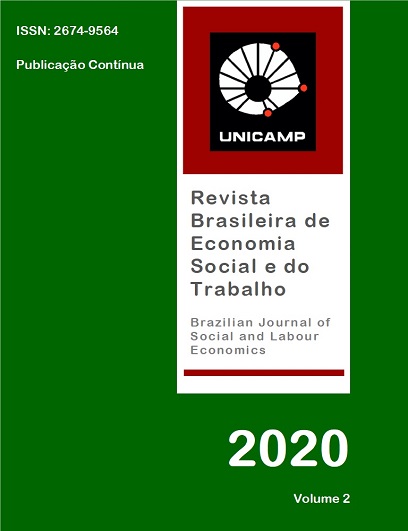Abstract
Brazil, in the post-crisis period of 2015/2016, has “advanced” towards greater flexibility in relations and labor regulation. This trajectory has caused significant changes in the world of work, especially regarding its organization and dynamics. This article seeks to present some reflections on the impacts of the Labor Reform of 2017, of the edition of MP no 881 that institutes the Declaration of Rights of Economic Freedom and MP no 905 (Yellow Green Labor Contract) on the future of the labor market in Brazil. To this end, the data available at CAGED and PNAD Continuous will be explored. The data have pointed out that the implemented Labor Reform was not able to provide a recovery of the labor market, despite the discourse of modernization of the CLT, which presented it as an indispensable condition for the country to generate jobs again. The new round of easing of labor legislation went in the same direction, that is, the non-recovery of the labor market. In conclusion, it is argued that the solution to the problems of employment and income is to increase economic activity associated with regulatory mechanisms that protect and do not remove workers' rights.
References
BARBOSA, A. F. A formação do mercado de trabalho no Brasil: da escravidão ao assalariamento. Tese de Doutorado. Instituto de Economia da Unicamp, Campinas, 2003.
CONGRESSO NACIONAL (2019). Quadro Comparativo Medida Provisória nº 881/2019.
Comissão Mista da Medida Provisória nº 881, de 2019, Secretaria Legislativa do Congresso Nacional – SLCN, Brasília 16/08/2019.
SENADO FEDERAL (2019). Projeto de lei de conversão nº 21, de 2019 (Proveniente da Medida Provisória n° 881, de 2019). Disponível em: https://legis.senado.leg.br/sdleg-getter/documento?dm=7992045&ts=1566241194128 &disposition=inline. Acesso em 20 de agosto de 2019.
DEDECCA, C. S. Racionalização econômica e trabalho no capitalismo avançado. Campinas: UNICAMP/IE, 2005.
DEDECCA, C. S. Notas sobre a Evolução do Mercado de Trabalho no Brasil. Revista de Economia Política, vol. 25, nº 1 (97), pp. 94-111, janeiro-março de 2005b.
FREYSSINET, J. As trajetórias nacionais rumo à flexibilidade da relação salarial: a experiência europeia. In: GUIMARÃES, N. A. (Org.). Trabalho flexível, empregos precários? Uma comparação Brasil, França, Japão. São Paulo: Editora da USP, 2009.
IBGE Pesquisa Nacional por Amostra de Domicílios Contínua. Divulgação Especial. Medidas de Subutilização da Força de Trabalho no Brasil. Rio de Janeiro, 22 de novembro de 2016.
KREIN, J. D. As tendências recentes nas relações de emprego no Brasil: 1990-2005. (Tese de doutorado). Campinas: IE/UNICAMP, 2007.
KREIN, J. D. As transformações no mundo do trabalho e as tendências das relações de trabalho na primeira década do século XXI. Revista NECAT, v. 2, p. 6-65, 2013.
TROVÃO, C. J. B. M.; ARAUJO, J. B. Transformações no mercado de trabalho e a experiência brasileira pós reforma trabalhista de 2017. Research, Society and Development, v. 7, p. 1-24, 2018.
TROVÃO, C. J. B. M.; ARAÚJO, J. B. O mercado de trabalho após a reforma trabalhista de 2017. CARTA SOCIAL E DO TRABALHO, v. 1, p. 32-45, 2018.

This work is licensed under a Creative Commons Attribution-NonCommercial-ShareAlike 4.0 International License.
Copyright (c) 2020 RBEST: Revista Brasileira de Economia Social e do Trabalho

